Key takeaways:
- Clear vision and detailed planning are essential for successful event organization, ensuring all aspects are thoughtfully considered.
- Utilizing digital tools and checklists helps streamline communication and task management, reducing stress and enhancing teamwork.
- Flexibility and adaptability are crucial when unexpected challenges arise, highlighting the importance of maintaining open communication among all stakeholders.
- Post-event debriefs foster continuous improvement by evaluating successes and areas for development, strengthening team cohesion.
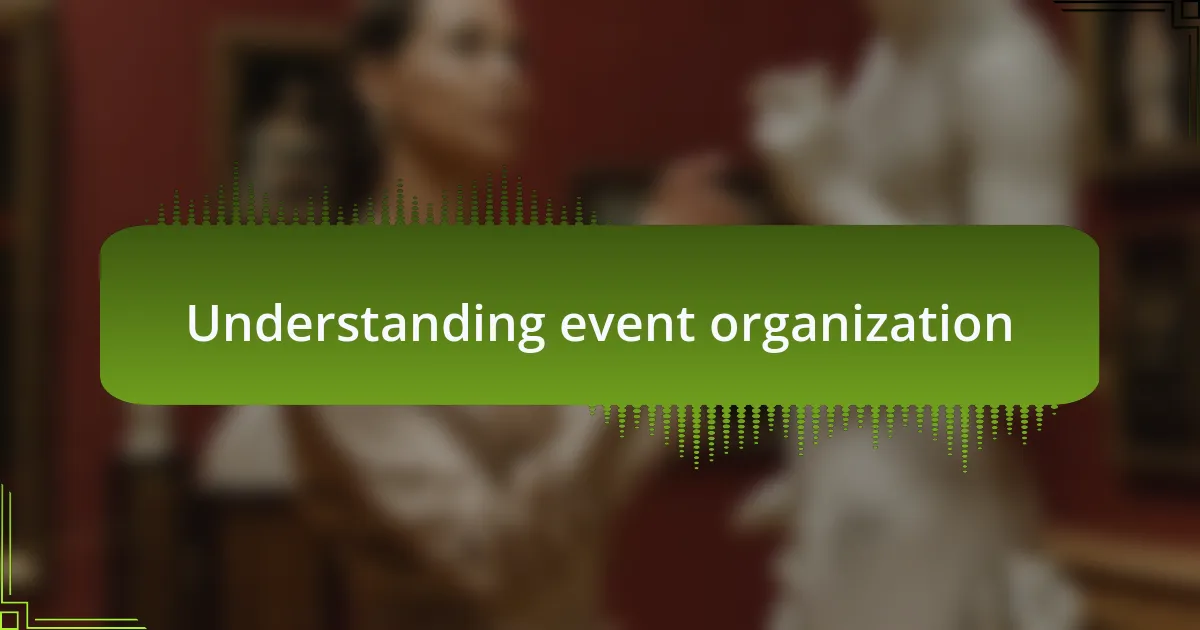
Understanding event organization
When I think about event organization, it strikes me how crucial it is to have a clear vision. I remember planning a small workshop, and realizing that without a defined purpose, everything felt chaotic. Have you ever jumped into a project without a blueprint? It can feel overwhelming, and that’s precisely why understanding the goals of your event is the bedrock upon which everything else is built.
Every detail matters in event organization, from venue selection to schedule management. I once faced a situation where I neglected to consider the flow of attendees, which resulted in bottlenecks that frustrated both guests and speakers. It’s a reminder that the layout needs to facilitate movement and engagement, making it so essential to think through the attendee experience. How often do we underestimate the importance of such details?
The emotional journey of organizing an event is as significant as the logistical one. I often find myself wrestling with stress and excitement in equal measure. This duality keeps me grounded and focused, reminding me that while challenges arise, the joy of pulling everything together is what makes the effort worthwhile. Have you ever felt that mix of apprehension and anticipation? It’s that feeling that drives us to create memorable events.
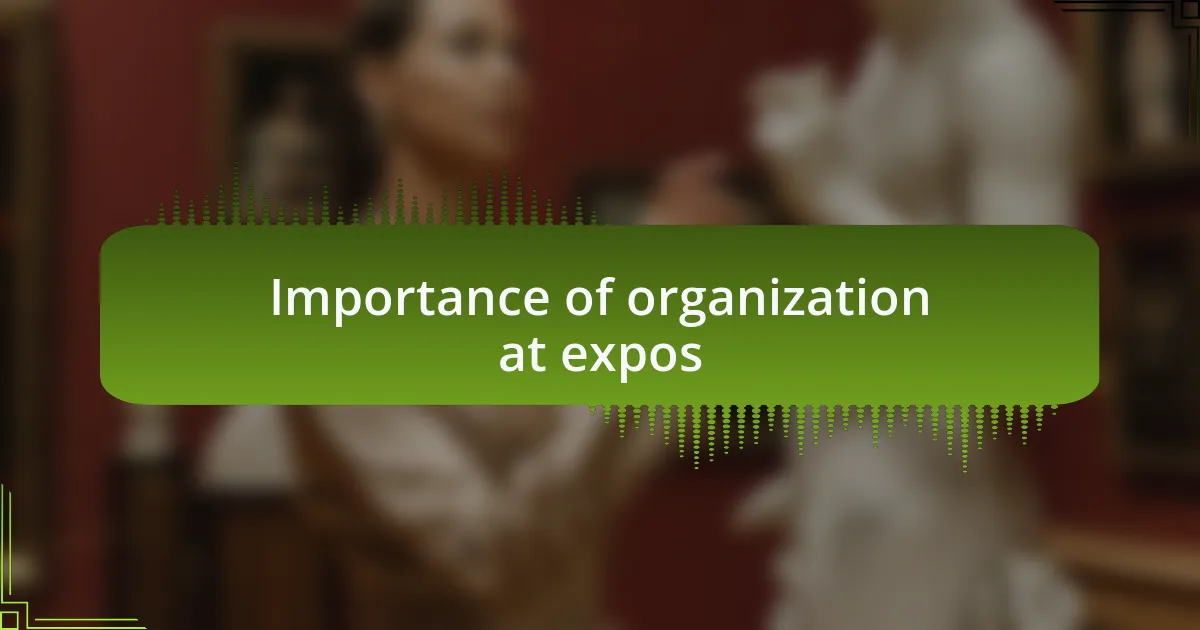
Importance of organization at expos
Organization is not just a helpful skill at expos; it’s the cornerstone of a successful experience for everyone involved. I recall a particular expo where I underestimated the sheer volume of materials needing arrangement—booths were still being set up long after guests had arrived. Imagine the confusion and missed networking opportunities! All this chaos could have been avoided with a solid organizational plan in place.
When everything is in its right place, the event flows seamlessly, allowing attendees to fully engage with the content presented. Last year, I set up a timeline for an audiovisual showcase that kept everything on track and the speakers at ease. Did you know that having a well-structured schedule can also lessen anxiety? By organizing the agenda, I noticed participants were more relaxed and open to networking, enhancing the overall vibe of the expo.
Perhaps the most rewarding aspect of organization is the camaraderie it fosters. I still think back to a time when team collaboration surged during an expo thanks to our clear communication and duties assigned well in advance. Have you ever experienced that team spirit when everyone knows their role? It’s a feeling that transforms a hectic environment into a harmonious experience, and it’s precisely why I believe strong organizational skills are indispensable at expos.
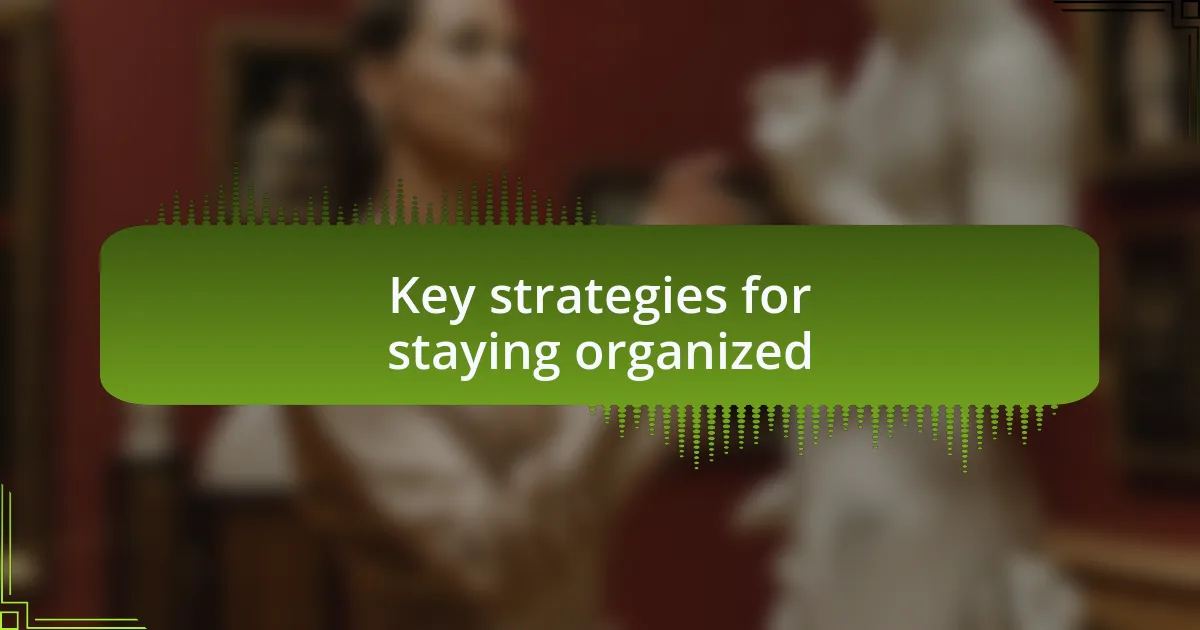
Key strategies for staying organized
One key strategy for staying organized at events is to create a detailed checklist well in advance. I once tackled an expo without a checklist and felt overwhelmed as I raced against the clock. Since then, I’ve learned that breaking down tasks into smaller, manageable parts makes it easier to stay focused and ensures nothing falls through the cracks. Have you ever had that moment of panic when you realize you forgot something crucial? A checklist can be your best friend in avoiding that sinking feeling.
Another effective approach is to utilize digital organizational tools. I started using apps that allow me to share schedules and updates with my team in real-time. This not only keeps everyone on the same page but also enhances collaboration, creating an atmosphere where all ideas can flow seamlessly. Have you noticed how technology can streamline communication at events? I certainly have, and embracing these tools has transformed my approach to event management.
Finally, I find that assigning roles and responsibilities is crucial. During one expo, I delegated tasks based on each team member’s strengths, and it was remarkable how much smoother everything went. It’s amazing what happens when everyone knows their area of focus; you can feel the energy shift from confusion to clarity. Have you experienced the power of teamwork? It’s a game changer, and it’s a testament to how organization can elevate an event to new heights.

Tools and technology for organization
When it comes to tools and technology for organization, I can’t emphasize enough the power of event management software. I remember a particularly chaotic event where I kept losing track of tasks and deadlines. After switching to a dedicated platform, I felt a weight lift off my shoulders, as everything became easily accessible. Have you ever wished for a magical dashboard that shows you all the moving parts at once? That’s precisely what these tools offer, transforming chaos into clarity.
Another technology that has changed the game for me is cloud storage. I used to struggle with sharing documents during events, leading to endless back-and-forth emails. Now, with everything stored in the cloud, I simply share a link and my team can access the latest versions instantly. It’s not only efficient; it reduces the chances of miscommunication. Isn’t it comforting to know that everyone has the same up-to-date information at their fingertips?
Lastly, I’ve found that utilizing communication apps keeps my team connected throughout the event. During one specific expo, I opted for a messaging app that allowed for instant updates and discussions. That made it easy to adapt quickly to any arising issues, almost like a virtual huddle whenever we needed it. Have you ever experienced a situation at an event where quick communication made all the difference? I definitely have, and it’s reinvigorated how I approach teamwork in high-pressure environments.
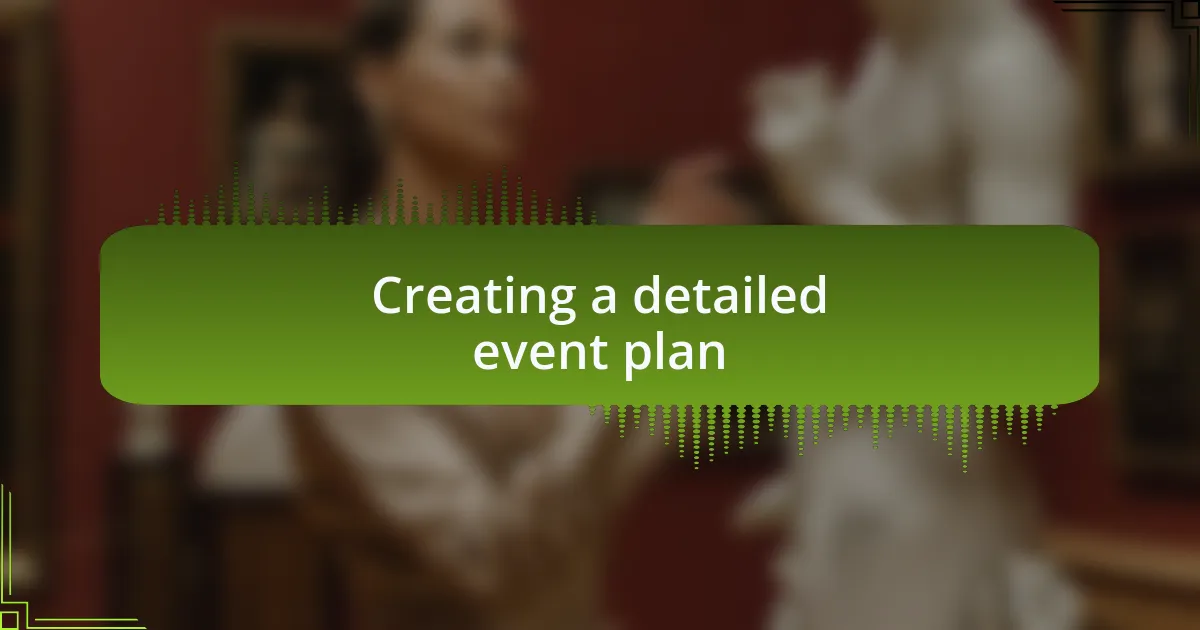
Creating a detailed event plan
Creating a detailed event plan starts with outlining each stage of the event’s lifecycle. I recall an event where I meticulously mapped out timelines, from the initial brainstorming sessions to the final wrap-up. Having that roadmap made it possible to anticipate potential challenges and allocate resources effectively. Have you ever felt overwhelmed by the sheer number of tasks an event demands? A well-structured plan can be your best ally in staying ahead of the game.
As I drafted the plan, I broke it down into key sections—logistics, marketing, and stakeholder engagement. Each segment required its own set of considerations, and I found that listing out specific action items under each category kept me and my team focused. It’s fascinating how a simple checklist can transform an abstract idea into actionable steps. Have you tried this approach? I assure you it clarifies roles and responsibilities, significantly reducing uncertainty.
Finally, I make it a point to integrate feedback loops into my plans. After every event, I sit down with my team to discuss what worked and what didn’t. This reflection not only helps improve future events but also fosters a culture of continuous learning. Have you ever overlooked this crucial step? If you truly want to elevate your event planning skills, embracing feedback can unlock insights you might have otherwise missed.
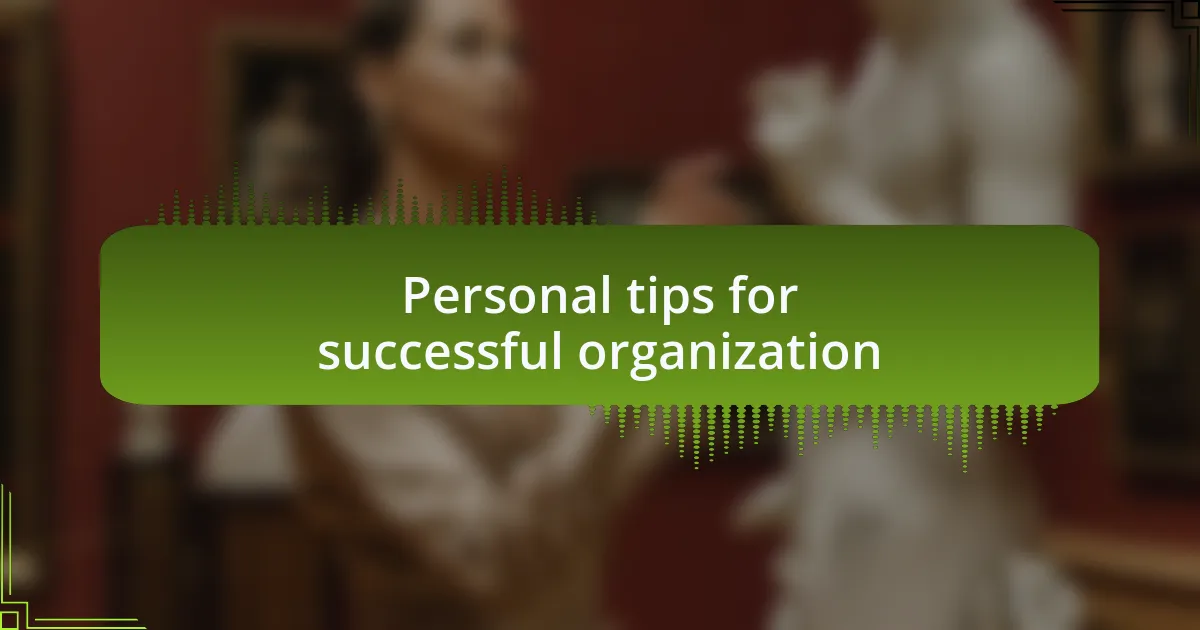
Personal tips for successful organization
To stay organized during events, I find it invaluable to utilize a centralized digital tool for tracking progress. When I first experimented with project management software, I was amazed at how it transformed my workflow. It kept everything from guest lists to vendor contacts in one place. Have you ever just frantically shuffled between different apps? Having a single platform where all information is stored not only reduces stress but also allows for real-time updates, ensuring everyone is on the same page.
Another technique I swear by is the practice of setting mini-deadlines for myself and my team. I remember a particular expo where I found that assigning specific times for task completion created an amazing sense of urgency. Rather than waiting until the last minute, we became proactive. Have you noticed how momentum builds in a team when everyone is working toward a deadline? It fosters accountability and encourages constant progress, which is crucial for a successful event.
Lastly, the power of a dedicated space for brainstorming and collaboration should not be underestimated. During one memorable event, I set up a “war room” for my team where we could drop in throughout the planning process. It was a space filled with sticky notes, sketches, and a whiteboard. It became our creative hub—a place to reconnect and share ideas. Have you ever felt the magic of spontaneous collaboration? Those moments often lead to the best solutions and a deeper sense of camaraderie among team members.
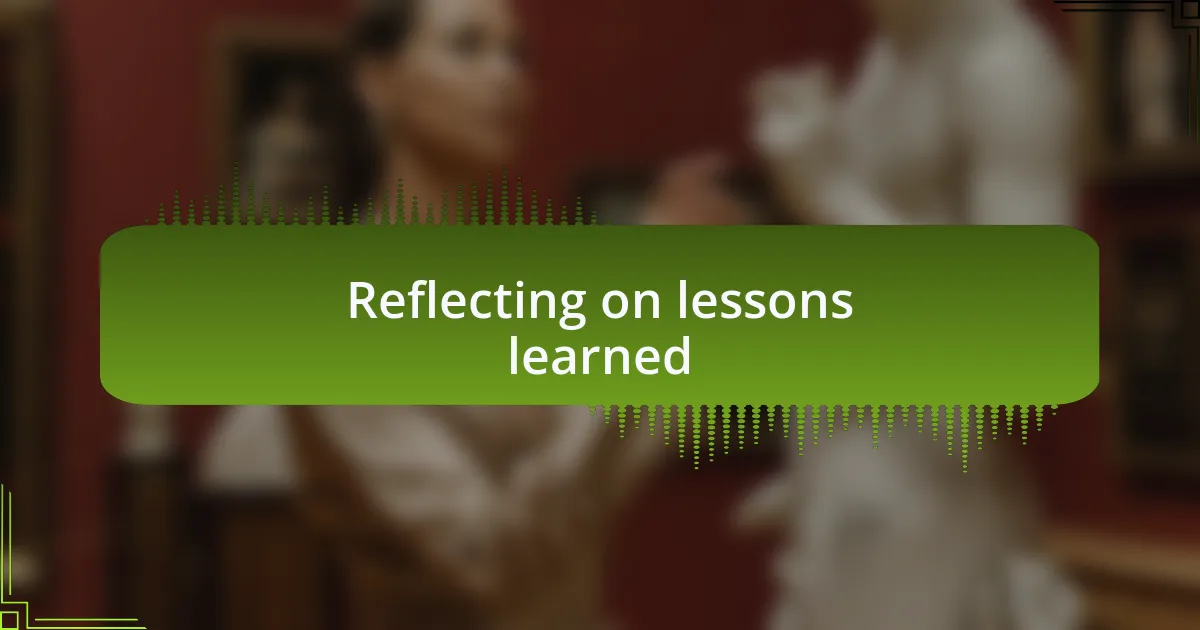
Reflecting on lessons learned
Reflecting on past events has taught me the importance of adaptability. I vividly remember an instance when a last-minute venue change sent us into a tailspin. Instead of panicking, we gathered as a team and recalibrated our plans on the fly. That experience reinforced how crucial it is to maintain flexibility in our organization strategies—after all, how often do things go exactly as planned?
One lesson that stands out is the value of post-event debriefs. After organizing a large audiovisual expo, we sat down as a team to evaluate what went well and what didn’t. I found it surprisingly therapeutic, almost like a weight was lifted off my shoulders. This reflection process not only highlights areas for improvement but also celebrates our successes, helping to solidify the team’s bond and motivation for future events.
Moreover, I’ve learned to prioritize communication with all stakeholders. During one event, I realized too late that some crucial updates weren’t being shared with every participant. It felt frustrating, but it drove home the reality that clear communication can make or break the experience. Have you ever felt the ripple effect of a missed message? It taught me to ensure everyone is informed and aligned, turning those experiences into more cohesive and successful collaborations.